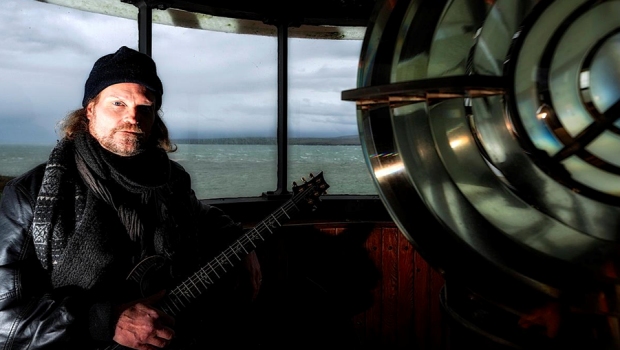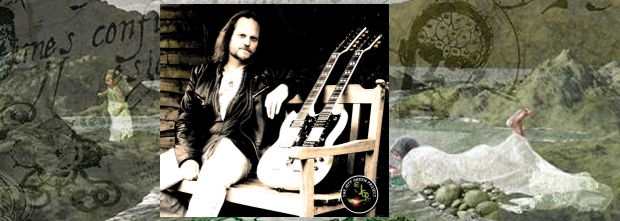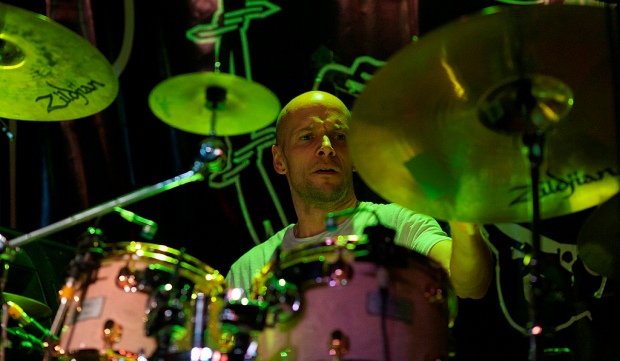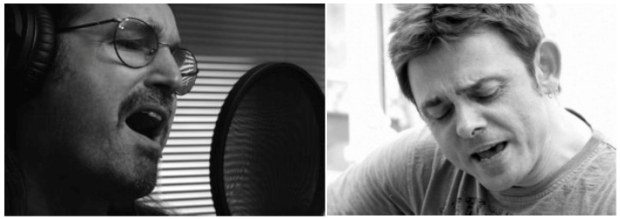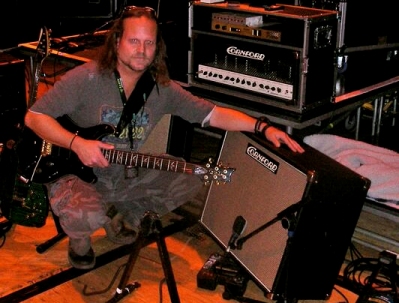In February this year Jeff Green released his second solo album, although less of a solo album this time around, as Elder Creek was released under the moniker of the Jeff Green Project and includes a fantastic collection of musicians and vocalists. As with his debut album the subject matter evolves from a deep personal experience, however despite the circumstances surrounding this, musically the album comes across as vibrant and uplifting. I recently caught up with Jeff to discuss the ideas, concepts and processes behind Elder Creek and we also chatted about the contributions made to this release by the other musicians and vocalists.
Bob: Many thanks for taking the time to chat with us and congratulations on the Elder Creek album…
Jeff: Thanks very much, it’s a pleasure!
Bob: How’s the response been to the album so far?
Jeff: Much to my relief, the response has been really good. It’s always a bit nerve wracking waiting for the initial reactions/reviews etc… but I’m very pleased so far!
Bob: I can imagine Elder Creek having a far wider appeal and not wholly confined within the progressive rock circles – can I ask what the response has been like further afield?
Jeff: Well, it’s still early days yet, but I’ve had some very nice compliments from people who are not prog fans, which is always nice. I wouldn’t like to think that the appeal is only limited to certain genres.
Bob: I read on your website that prog is your first love, musically speaking, however on the first couple of listenings to Elder Creek I was more minded more of a mixture of Classic Rock and Southern Rock. Of the latter bands such as The Eagles (perhaps an obvious choice), along with the Allman Brothers, The Doobie Brothers, Poco, etc. Only as you delve into the tracks do the more progressive elements become apparent. Would that be a fair observation?
Jeff: I think it is actually. I’ve always felt that a true influence is something that creeps in to ones artistry, whatever that may be, in an entirely natural fashion, which is usually subliminal. We all have our favourites, but that doesn’t necessarily make them influences. On my first album, “Jessica” for example people were saying that they could hear similarities to bands such as Camel and Eloy. Now, I’m sure I’ve heard music by both bands in the past but have never actually owned an album by either. Same goes for the Eagles. It may seem strange, but I never actually owned an album by them until I joined the Illegal Eagles back in ’97. They were a band I had constantly heard on the radio during the 70’s and 80’s I respected their songwriting and musicianship, but was far more interested in Prog bands such as, Yes, Genesis, Rush Kansas, Pink Floyd etc.…
It’s funny because in the past when I’ve played some of my material to friends who are more into classic rock, metal, pop or what have you, they invariably say, “Oh that’s that prog rock stuff” However, the die hard prog fans have said that they can hear elements of the bands that you have mentioned. So, I suppose a lot of it is about the perception of the listener. I actually think this is a good thing and I take it as a compliment because it means that I’m combining what I enjoy with what has left it’s mark on me on a much more subliminal level. I think to approach songwriting any other way could come across as contrived.
Bob: This said there is one notable exception to this and that is the epic A Long Time From Now. Could you talk us through your thought processes for this track?
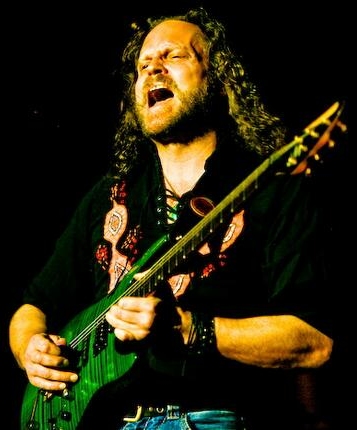 Jeff: How long do you have? Ha ha! This was actually the first song that was written specifically for the album. Originally, I had about three or four separate ideas that were going to end up as individual songs. However, after listening back to them over the course of a few weeks, it became obvious that they needed to exist together in a single song. I’ve always been a big fan of side long conceptual pieces, “Hemispheres” by Rush and “Close To The Edge” being two of my favourites and they were certainly an inspiration to me. Rather than writing a dissertation about dementia set to music, I decided to use a bit of Greek Mythology to tell the story. I don’t want to spell it out here because I’d like people to interperate it in their own way, but the classic “Hero Cycle” plays a large part.
Jeff: How long do you have? Ha ha! This was actually the first song that was written specifically for the album. Originally, I had about three or four separate ideas that were going to end up as individual songs. However, after listening back to them over the course of a few weeks, it became obvious that they needed to exist together in a single song. I’ve always been a big fan of side long conceptual pieces, “Hemispheres” by Rush and “Close To The Edge” being two of my favourites and they were certainly an inspiration to me. Rather than writing a dissertation about dementia set to music, I decided to use a bit of Greek Mythology to tell the story. I don’t want to spell it out here because I’d like people to interperate it in their own way, but the classic “Hero Cycle” plays a large part.
Given the title of the album and my fondness for all things aquatic, I new that water was going to be the main theme of the piece. I found the idea that it can be a source of both separation and connection an interesting concept. This is where the Greek Mythology and in particular, the River Lethe came in. At this point I decided that I would tell the story as a “journey”.
Once I had the general outline established, I began to work the separate movements of the piece together; writing segues and bridges to (hopefully!) provide a smooth transition between each movement.
I’d have to say that this is probably my favourite song on the album and certainly the most fulfilling for me as both a musician and composer.
Bob: There’s a rich tapestry of melodic guitars and multi-layered vocal harmonies on the album. Has this been influenced by your ‘day job’ with the Illegal Eagles and played a part in the way you write?
Jeff: I wouldn’t say working with the Illegal Eagles was an influence as much as it was a reinforcement of the influences that were there to begin with. I’ve always had a fascination with multi-layered vocal harmonies and guitar parts. A lot of it goes back to bands such as The Beatles, Yes and Queen. Working with the IE’s gave me the practical knowledge and experience to develop those influences in both a studio and live setting. Certainly, playing with the band for 17 years has helped developed my songwriting and arranging chops.
Bob: The album has a strong flow from start to finish. Can you give us some background as to the writing process here, for instance was there a bigger picture from the outset or did you construct the songs as individual pieces?
Jeff: I’ve never been very good at writing your typical type of pop song. I’m very much more into writing songs around a unifying theme. With Elder Creek, there was a definite concept from the very beginning, which is the subject of memory and in particular, my Grandmother’s battle with dementia. Having discussed the idea with my Father and sharing some lyrical ideas together, I began to draw up an outline of the story, with the individual songs acting as chapters. Once I had that worked out, I started working on the music, trying to capture the right mood for the subject of the individual songs.
Bob: So would you start from melody, a chord progression or a lyrical idea? Or does it vary?
Jeff: All three and in this case it varied at great deal! I have quite a large collection of riffs and chord progressions that I’ve come up with over the years. Some came about when I was teaching and would make up chord progressions for my students to improvise over. Others would come about when I was practicing, using different chords and scales. In either case, when something stands out or feels “special” I will record the parts and save them for another time.
In the case of Elder Creek, I had quite a few lyrical ideas already, so I went back to my catalogue of riffs and chord progressions to see if any would fit. Quite a few of the songs came about this way.
I’m not a keyboard player, so I use a guitar synthesizer to come up with sounds not possible on the guitar. This is often a great source of inspiration as using the guitar synth lends it self to playing in a different way. Another thing I like to do is set down a groove on a drum machine, grab my bass and just jam away until I find something I like. From there, I’ll use the guitar and/or synth to flesh out the chord structures and melodies. It’s a very creative process and I enjoy it immensely!
Bob: Great to see Pete Riley, Mike Stobbie and Phil Hilborne returning from the Jessica album. So when you started the writing process for Elder Creek did you have a core band in mind?
Jeff: Yes, I was so pleased with the way Jessica came out, there was no hesitation whatsoever in using the same guys again. The only differences were the additions of Andy Staples on bass. I asked Pete if he could recommend a bass player that he had worked with and would be sympathetic to his playing. He immediately suggested Andy, which proved to be an inspired choice!
Bob: There’s a very organic and band feel to the music. Considering that you don’t have a full-time band to rehearse with and bounce ideas from, does this hinder you in any way? Or you happier have complete artistic control?
Jeff: I have to admit that I do miss having a band to bounce ideas off of in a rehearsal studio in “real time”. Unfortunately, the days of big record company budgets and unlimited time in the studio are long gone. Working in this way has become an art in itself, which is why it is so important to work with people that have an understanding of what you’re trying to do.
Bob: I’m presuming that when you have finished a track that it is then sent in an audio format to the musicians concerned to learn. How much ‘interpretation’, if any, is allowed at this point? I’m thinking about Pete Riley’s parts here as this forms the fundamental backdrop to the song.
Jeff: Exactly. I would say that on this album 20% of what you hear are things that I definitely wanted to keep “as is” the rest was very much open to interpretation. Not allowing the musicians to express themselves would defeat the object of hiring them in the first place.
Pete is great, I sent him two versions of the songs. One with my drum programming and one with just a click track. He would then record his parts and send them back asking if I wanted anything done differently. To make a long story short, I didn’t change a thing.
Bob: So would you then consider re-writing parts?
Jeff: Not so much re-writing parts as much as changing some of the emphasis, rhythms, and accents here and there.
Bob: What, other than being a fantastic player of course, does Mike Stobbie bring to the table?
Jeff: Where to begin! First and foremost, a wealth of experience and professionalism. Mike has the uncanny ability to really see the overall picture and concept. We spent 16 days over the course of several months together working in his studio from about 12pm – 8pm. During that time, Mike would ask me questions relating to the subject matter of each song and where I wanted to go with it. From there, he would listen to the vocal melodies, my guitar parts and experiment with sounds, melodies etc.…
Mike has a great deal of empathy as regards my songwriting and knows how to bring out the best. He really transformed some of the songs. Also, We’re both big fans of analogue keys and various keyboard players such as Rick Wakeman, Peter Banks, Keith Emerson, Rick Wright, Jon Lord etc.. So, we had a great deal in common from the beginning.
Bob: Vocally Elder Creek is very rich. You enlisted Alan Reed (A Long Time From Now) and Sean Filkins (Elder Creek) to guest on two tracks, was it always your idea to have guest vocalists?
Jeff: Absolutely. Many bands that I enjoy listening to have multiple lead vocalists. The Eagles, Pink Floyd, The Beatles and Queen spring to mind. I love the way that one vocalist might take a verse and another will take over the chorus or bridge. I think it can add a whole new dimension to the song. Particularly when you’re writing from the point of view of different people.
Bob: So how did they come about?
Jeff: I knew from the beginning that I’d like to get Garreth Hicklin involved as he has a fantastic voice and we’ve worked together for some time. My good friend Phil Chelmsford suggested having a few other guests as well. Enter Sean Filkins and Alan Reed. I listened to their back catalogues and worked out which songs I thought would best suit their vocal styling’s. They did a brilliant job and I’m very grateful for their contributions!
Bob: The first album was recorded pretty much at home I believe, however for the new album you recorded parts at Garreth Hicklin’s studio?
Jeff: Yes, Garreth has a wonderful studio at his home in Essex that he built with his Father. He very kindly offered his services and we recorded all of the rhythm guitar parts there as well as about 95% of the vocals.
Bob: There’s a wide range of guitar sounds on the album. Are you a ‘techy’ when it comes to choosing sounds?
Jeff: Yeah, I’m very much a gadget man! I love experimenting with different equipment/software etc.. However, when it comes to actually choosing sounds, I try and keep them in fitting with the song. It’s very easy to get distracted and go off on a tangent though!
Bob: Does this happen with which type of guitar, amp and combinations of both you use?
Jeff: Well, for this album I used my Cornford MK50II exclusively. It’s an incredibly great sounding and versatile amp. About 90% of the guitar parts were done on my PRS 513, so that part of the recording process remained pretty much the same. The more “techy” aspect comes into play when choosing effects, modulation, delays, reverbs, etc.. That’s where the fun begins!
Bob: One final question about the album – why Elder Creek?
Jeff: Elder Creek is an area of Sacramento not far from where I grew up. Although neither my family nor I have any particular connection with the area, a road sign bearing it’s name always fascinated me. It was on an unlit road that I would have to pass by on my way to band rehearsals. Whenever I passed by that sign, the name Elder Creek struck me as being a great name for a band. I hadn’t thought about it for some time, but when my Father and I began discussing themes for the album, the name popped back in to my head and I thought that given the albums concept and water imagery, it would work very nicely as the title.
Bob: OK let’s move on to the next album and presumably work is under way for album No3? If the opportunity arose is there any one you would like to collaborate with on the new project?
Jeff: Oh yes, I have a wish list! Steven Wilson, Alan Parsons, Trevor Horn, Nick Raskulinecz, Rupert Hine, Peter Collins to name a few. Not likely, but if any of you guys are reading this… ha ha!!
Bob: OK the albums been out for a few weeks now and you’ve announced a couple of gigs (The Cambridge Rock Festival and one with CRS with UPF) – but are there any plans to tour.
Jeff: Not a tour as such. Logistically, it just wouldn’t be possible to pull off with me living in Ireland, but we are working on putting some more dates together.
Bob: I appreciate that touring can be a fairly unrewarding business these days and the modern trend is to team up with one or two other bands to make the package more attractive. Might this be an option?
Jeff: Absolutely! In fact, I’ve been having chats with some other bands about this very possibility. I really think it’s the best way forward for bands like ourselves. Plus, it provides variety for the fans which I feel is very important.
Bob: The album is excellently produced – are you concerned about pulling it off live?
Jeff: I’m always concerned! Anybody who knows me is aware of the fact that I am quite a worrier ha ha! Having said that however, I’m currently writing out charts for the band and we’re planning some intensive rehearsals leading up to the gigs, which I’m really looking forward to.
Bob: Do you know the full band line-up for the live dates?
Jeff: Yes, we have Mark Cunningham on bass, Odgie Aldridge on drums, James Cornford on guitars and Mike Stobbie has come out of retirement to join us, which is quite an honour! There will we some guests as well, but I’m still waiting on confirmation before I announce anything just yet.
Bob: Prog seems have become a much broader church in the last few years. Which of the current bands have captured your interest?
Jeff: There are several I’ve become aware of via Prog Rock magazine that I’m really enjoying at the moment. Haken, DeeExpus, Touchstone, Purson to name a few. I think it’s a very vibrant and exciting scene at the moment!
Bob: On a lighter note what music is currently in the Jeff Green CD player or iPod?
Jeff: My wife and I started watching a fantastic French TV series called, “Les Revenants” a while back and I became spellbound by the soundtrack. Turns out that it was by Mogwai. I immediately bought a couple of their albums and am really enjoying. Very inspirational stuff!
Bob: Many thanks for chatting to us and we wish you every success with the album and the upcoming gigs.
LINKS
TPA Review of: Elder Creek
Main Website: Jeff Green
Social Media: Facebook

